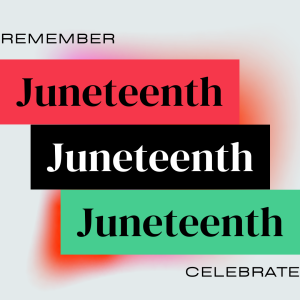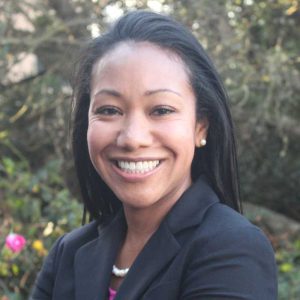Juneteenth: Freedom and Educational Equity
Published by: WCET | 6/21/2022
Tags: Diversity/Equity/Inclusion, Online Learning, Student Success
Published by: WCET | 6/21/2022
Tags: Diversity/Equity/Inclusion, Online Learning, Student Success

Juneteenth, or “Freedom Day” is the oldest nationally celebrated commemoration of the ending of slavery in the United States. Juneteenth not only celebrates the freedom of African Americans from slavery, but it also is a time when our achievements are noted, and continuous self-development is encouraged. WCET and Every Learner Everywhere sought to make a Juneteenth commemorative post showcasing the strength in the American spirit to recognize wrong and set about making it right.
Juneteenth offers an opportunity to talk about this complex history and here we share reflections from WCET Executive Leadership and Every Learner Equity Advisory Board and Staff on our ideas of freedom and educational equity and how freedom has shaped our educational experiences.

To me, educational equity means creating learning environments that enable all learners to achieve their fullest potential. In order to experience true liberation, we will need to dismantle systemic racism and classism, decenter whiteness in teaching and learning, and remove structural barriers in our educational policies and practices.
Working towards equity in Higher Ed is personal for me because my hope is that we will ultimately create a more equitable and fair learning experience for the future generation of students which includes my own children.

As a first-generation college student, woman of color, and daughter of an immigrant, I lead California Competes: Higher Education for a Strong Economy with the perspective that higher education can be a vehicle to prosperity for individuals and the communities they serve. Dismantling systems that do not serve today’s students equitably is our professional (and my personal) mission. My parents did not have the opportunity to go to college. They ended up in California after leaving challenging circumstances and had to carve their own pathways to success around the systematic barriers that kept them out. For me and my brother though, my parents emphasized that college was key, and it was instilled in me that higher education opens doors, creating the freedom of choices to turn one’s dreams and aspirations into reality. They were right. The benefits of higher education have profoundly impacted my life, and I want all Californians to have this opportunity—this freedom of choice on what trajectory to take—to reach their full potential, regardless of backgrounds and circumstances. The ultimate goal for us at California Competes is one where every individual can access higher education to bolster both personal and community development, engagement, and success.

When thinking about freedom and educational equity, I go to this quote from former US Secretary of Education and current managing partner at Emerson Collective Arne Duncan: “By becoming a champion country, we are answering a global call to action to focus the world’s attention on the cause of education and equal opportunity for all. A good education is one of the most powerful ways for nations to reduce poverty, become competitive and grow the economic pie for all. It’s better for individuals, for the country, and for the world when countries invest in education.” By promoting educational equity, we are positively impacting every aspect of society.

As a native South Texan, I learned that Juneteenth or “Freedom Day” is a part of the state’s history. Union soldiers arrived in Galveston, Texas, with the news that the Civil War was over and slavery in the United States was abolished. In 1979, the Texas Legislature passed a bill to mark Juneteenth as a state holiday. Forty-two years later, President Joe Biden signed the Juneteenth National Independence Day Act that establishes June 19 as a national holiday that commemorates the end of slavery and honors the culture and achievements of African Americans.
Educational equity, to me, is the foundational practices, policies, and procedures of academic fairness and inclusion. Every child/student deserves access to the necessary tools and resources that will provide an opportunity to be successful in their educational journey, K-12 and post-secondary. Yet, here we are in 2022, still met with challenges every day across the digital landscape of America.
As an administrative leader at an institution of higher education that primarily serves a Hispanic student population, my role is to provide educational technology services and resources to all students regardless of race, color, or economic class. My educational experiences differed from my parents, grandparents, and great-grandparents, but we lived through the challenges and persevered. Every generation experiences educational equity, and our role is to pay it forward as leaders to make a difference for every child/student.

Observing Juneteenth reminds me to celebrate how far Black Americans have come since the 1860’s, but also to reflect on the work that still needs to be done. I believe that education – specifically public education – is essential for the advancement of diversity, equity, inclusion, and freedom. Furthermore, I believe that online public education helps to expand access to educational opportunity, especially for students who can’t afford to pause family, home and work responsibilities for a traditional four-year, on-campus experience.
For me, Juneteenth inspires empathy for underserved student populations, and reminds me that the onus is on institutions of higher education to better serve underserved student groups and to narrow the equity gap in higher ed. I am proud to devote my career to improving educational access and am grateful for how Juneteenth challenges me.

On June 19, 1865, two years after the Emancipation Proclamation and two and a half months after the end of the Civil War, Major General Gordon Granger issued General Order Number Three in Galveston, Texas announcing the end of slavery and proclaiming, “This involves an absolute equality of personal rights and rights of property between former masters and slaves.” This proclamation, though, was not enough to end discrimination and inequality. In fact, racial discrimination became the law of the land when in 1896 the Supreme Court in Plessy v. Ferguson ruled that separate but equal facilities, including schools, were legal. This doctrine of separate but equal wasn’t struck down until almost sixty years later in Brown v. Board of Education. Yet, even then, educational discrimination remained and continues in 2022.
What does Juneteenth mean to me? For me, Juneteenth represents a powerful promise that has gone unfulfilled. Even the landmark Brown v. Board of Education has not been enough to ensure equitable education for all learners. Juneteenth teaches us that proclaiming something is not enough; we must actively work to make the promises of Juneteenth and Brown v. Board of Education a reality. Educational inequity isn’t a thing of the past; it persists. But it doesn’t have to. We have the ability to call out educational inequity when we see it and work to eradicate it. We can create an educational system where all learners have access to the resources they need to be successful. We can fulfill Juneteenth’s promise.

On Juneteenth, the truth about the end of slavery in the United States was finally proclaimed in Galveston, Texas. As Van outlines above, that did not immediately end inequality. But the truth was out there and they acted on that truth.
Distance and digital learning in higher education has evolved over the years to allow students to overcome the barriers of geographic and temporal separation. A truth that emerged in stark relief during the pandemic was that the digital divide barrier was much wider than we ever imagined. In particular, Black, Indigenous, LatinX, and poverty-affected students often found themselves on the outside looking in.
We, in the digital learning field, have been at the forefront of knocking down barriers for years. The new truth is out there about the digital divide. It is time for us to keep acting on that truth.
Juneteenth is more than an observance of freedom. It’s also a time to share the experiences of those who fought to seek true freedom for future generations. The celebration of Juneteenth acknowledges hard history while also empowering students to be advocates for change. Together we’ll continue to celebrate the freedom of African Americans, honor our achievements, and catalyze change in dismantling systemic racism and removing structural barriers to educational equity for every learner, everywhere.
Thank you to those featured in this post for sharing your reflections on this day.
To learn more about Juneteenth, we recommend visiting the Smithsonian’s National Museum of African American History & Culture’s Juneteenth webpage for more information and resources.
— WCET and ELE Staff